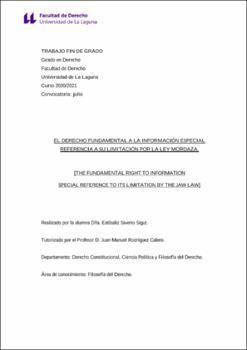El derecho fundamental a la información, especial referencia a su limitación por la ley mordaza
Autor
Siverio Sigut, EstibalizFecha
2021Resumen
El objeto de este trabajo de investigación gira en torno al derecho a la información,
que se configura como un derecho humano fundamental, que se regula en el artículo
20.1 d) de la Constitución Española, y que consiste en el derecho a comunicar
libremente o recibir información veraz por cualquier medio de difusión. Junto al
derecho a la información, tenemos el derecho a la libertad de expresión, y como
veremos, a pesar de ser dos derechos íntimamente conectados, nos encontramos ante
derechos distintos. También haremos referencia al derecho al honor ya que, en el
ejercicio de los derechos de información y libertad de expresión, este puede verse
comprometido. Prestaremos especial atención a la posible vulneración del derecho a
la información derivada de la polémica Ley Orgánica 4/2015, de 30 de marzo, más
conocida como ley mordaza, que limita derechos fundamentales y que lleva seis años
en vigor a pesar de los intentos para llevar a cabo su reforma. The object of this research work revolves around the right to information, which is
configured as a fundamental human right, which is regulated in article 20.1 d) of the
Spanish Constitution, and which consists of the right to freely communicate or
receive truthful information by any means of dissemination. Along with the right to
information, we have the right to freedom of expression, and as we will see, despite
being two closely connected rights, we are faced with different rights. We will also
refer to the right to honor since, in the exercise of the rights to information and
freedom of expression, this may be compromised. We will pay special attention to the
possible violation of the right to information derived from the controversial Organic
Law 4/2015, of March 30, better known as the gag law, which limits fundamental
rights and has been in force for six years despite attempts to carry out its reform





